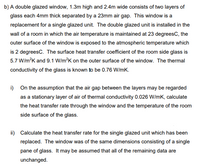
Elements Of Electromagnetics
7th Edition
ISBN: 9780190698614
Author: Sadiku, Matthew N. O.
Publisher: Oxford University Press
expand_more
expand_more
format_list_bulleted
Question

Transcribed Image Text:b) A double glazed window, 1.3m high and 2.4m wide consists of two layers of
glass each 4mm thick separated by a 23mm air gap. This window is a
replacement for a single glazed unit. The double glazed unit is installed in the
wall of a room in which the air temperature is maintained at 23 degreesC, the
outer surface of the window is exposed to the atmospheric temperature which
is 2 degreesC. The surface heat transfer coefficient of the room side glass is
5.7 W/m?K and 9.1 W/m?K on the outer surface of the window. The thermal
conductivity of the glass is known to be 0.76 W/mK.
i) On the assumption that the air gap between the layers may be regarded
as a stationary layer of air of thermal conductivity 0.026 W/mK, calculate
the heat transfer rate through the window and the temperature of the room
side surface of the glass.
ii) Calculate the heat transfer rate for the single glazed unit which has been
replaced. The window was of the same dimensions consisting of a single
pane of glass. It may be assumed that all of the remaining data are
unchanged.
Expert Solution
This question has been solved!
Explore an expertly crafted, step-by-step solution for a thorough understanding of key concepts.
Step by stepSolved in 3 steps with 3 images

Knowledge Booster
Learn more about
Need a deep-dive on the concept behind this application? Look no further. Learn more about this topic, mechanical-engineering and related others by exploring similar questions and additional content below.Similar questions
- PROBLEM 1Consider an adult human standing in the centre of a closed room. The air and room’swalls, ceiling and floor surrounding the being are at a temperature of 25oC. Assume forthe adult body a temperature of 37oC, a surface area of 1.7m2, an emissivity of 0.95 andthe heat transfer coefficient of 6 W/m2K for natural convection between the air and thebody. Question:(a) Describe the modes of heat transfer between the adult human and theirsurroundings. What are some assumptions that must be made before calculatingthe heat transfer rates?(b) Determine the total rate of heat transfer from the adult into their surroundings.arrow_forwardA household oven door of 0.4 m height and 0.6 m width reaches an average surface temperature of 50°C during operation. Estimate the total heat loss to the room with ambient air at 22°C and convective heat transfer coefficient 5 W/m².K, if the door has an emissivity of 0.83 and the surroundings are also at 22°C.arrow_forward1. (a) Consider a room with a 1.8-m-high and 2.0-m-wide double-pane window consisting of two 4-mm-thick layers of glass separated by a 10-mm-wide stagnant air space. The convection heat transfer coefficients on the inner and outer surfaces of the window are 12 W/m2 K and 25 W/m2 K, respectively, while the average thermal conductivity of glass is 0.78 W/m K; and the air, 0.026 W/m K. If the room is maintained at 22 oC, the outside temperature is -4 oC and heat transfer due to radiation can be neglected, determine: (i) Draw the sketch and thermal resistance network; (ii) the total thermal resistance; (iii) the steady rate of heat transfer through this double-pane window; (iv) the temperature of the inner surface of the window.…arrow_forward
- How does a fin enhance heat transfer at a surface?arrow_forwardA dry-ice storage chest is a wooden box lined with glass fiber insulation 5 cm thick. The wooden box is 2 cm thick and is cubical, 60 cm on an edge. The inside surface temperature is -76 RC, and the outside surface temperature is 18 RC, Determine (a) the wood insulation interface temperature; (b) the heat gain per day.arrow_forward
arrow_back_ios
arrow_forward_ios
Recommended textbooks for you
 Elements Of ElectromagneticsMechanical EngineeringISBN:9780190698614Author:Sadiku, Matthew N. O.Publisher:Oxford University Press
Elements Of ElectromagneticsMechanical EngineeringISBN:9780190698614Author:Sadiku, Matthew N. O.Publisher:Oxford University Press Mechanics of Materials (10th Edition)Mechanical EngineeringISBN:9780134319650Author:Russell C. HibbelerPublisher:PEARSON
Mechanics of Materials (10th Edition)Mechanical EngineeringISBN:9780134319650Author:Russell C. HibbelerPublisher:PEARSON Thermodynamics: An Engineering ApproachMechanical EngineeringISBN:9781259822674Author:Yunus A. Cengel Dr., Michael A. BolesPublisher:McGraw-Hill Education
Thermodynamics: An Engineering ApproachMechanical EngineeringISBN:9781259822674Author:Yunus A. Cengel Dr., Michael A. BolesPublisher:McGraw-Hill Education Control Systems EngineeringMechanical EngineeringISBN:9781118170519Author:Norman S. NisePublisher:WILEY
Control Systems EngineeringMechanical EngineeringISBN:9781118170519Author:Norman S. NisePublisher:WILEY Mechanics of Materials (MindTap Course List)Mechanical EngineeringISBN:9781337093347Author:Barry J. Goodno, James M. GerePublisher:Cengage Learning
Mechanics of Materials (MindTap Course List)Mechanical EngineeringISBN:9781337093347Author:Barry J. Goodno, James M. GerePublisher:Cengage Learning Engineering Mechanics: StaticsMechanical EngineeringISBN:9781118807330Author:James L. Meriam, L. G. Kraige, J. N. BoltonPublisher:WILEY
Engineering Mechanics: StaticsMechanical EngineeringISBN:9781118807330Author:James L. Meriam, L. G. Kraige, J. N. BoltonPublisher:WILEY

Elements Of Electromagnetics
Mechanical Engineering
ISBN:9780190698614
Author:Sadiku, Matthew N. O.
Publisher:Oxford University Press

Mechanics of Materials (10th Edition)
Mechanical Engineering
ISBN:9780134319650
Author:Russell C. Hibbeler
Publisher:PEARSON

Thermodynamics: An Engineering Approach
Mechanical Engineering
ISBN:9781259822674
Author:Yunus A. Cengel Dr., Michael A. Boles
Publisher:McGraw-Hill Education

Control Systems Engineering
Mechanical Engineering
ISBN:9781118170519
Author:Norman S. Nise
Publisher:WILEY

Mechanics of Materials (MindTap Course List)
Mechanical Engineering
ISBN:9781337093347
Author:Barry J. Goodno, James M. Gere
Publisher:Cengage Learning

Engineering Mechanics: Statics
Mechanical Engineering
ISBN:9781118807330
Author:James L. Meriam, L. G. Kraige, J. N. Bolton
Publisher:WILEY